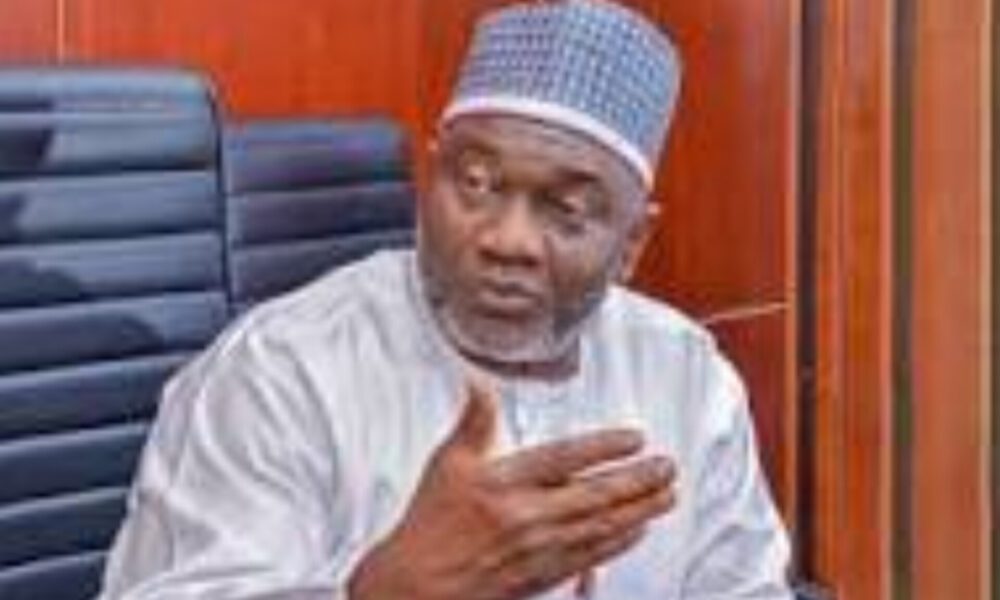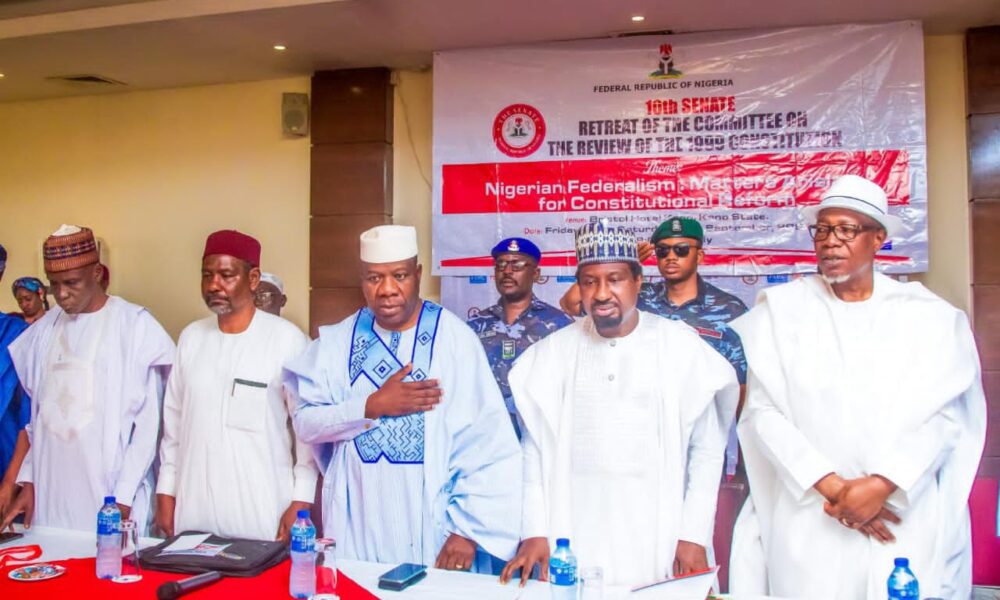The Senate has approved the 2025–2027 Medium-Term Expenditure Framework (MTEF) and Fiscal Strategy Paper (FSP) while mandating a comprehensive investigation into allegations that the Nigerian National Petroleum Corporation Limited (NNPCL) withheld ₦8.48 trillion in petrol subsidies and $2 billion (₦3.6 trillion) in unpaid taxes.
The approval followed the presentation of a report by Senator Sani Musa (Niger East), Chairman of the Joint Committees on Finance and National Planning & Economic Affairs. The fiscal document sets key projections, including an exchange rate of ₦1,400 to the dollar for 2025 and a GDP growth rate of 4.6%.
The Senate also tasked its Committees on Finance and Petroleum as well as Gas to investigate allegations that the Nigerian National Petroleum Corporation Limited (NNPCL), withheld about N8.48 trillion in petrol subsidies, and $2 billion (NGN 3.6 trillion) in unpaid taxes (dividends).

The allegation was highlighted by reports from the Nigeria Extractive Industries Transparency Initiative (NEITI) and the Revenue Mobilization, Allocation, and Fiscal Responsibility Commission.
This was just as the Office of the Auditor-General of the Federation, said it had received the necessary and complete documents required to verify the N2.7 trillion fuel subsidy claim by the Nigerian National Petroleum Company Limited against the government.
The Chairman, Senate Committee on Public Accounts, Senator Aliyu Wadada, corroborated the claims of the AuGF on the floor of the red chamber yesterday when he said the NNPCL team had been consistently shunning his panel’s summons over the matter.
The Senate, approved the exchange rate projection of 1,400 to a dollar for the 2025-2027 with a provision for review in early 2025, based on prevailing monetary and fiscal policies.
The upper chamber also resolved that any excess on the official figure would be used for debt servicing.
In its resolutions, the Senate also adopted inflation rate projections of 15.75, 14.21 and 10.04 per cent for 2025, 2026 and 2017 respectively.
Part of the resolutions read, “The 2025 Federal Government of Nigeria budget proposed spending of N47.9trilion of which N34.82 trillion is retained. New borrowings stood at N9.22tn, made up of both domestic and foreign borrowings.
“Capital expenditure is projected at N16.48 trillion naira with statutory transfers standing at 4.26 trillion naira and sinking funds projected at N430.27billion.
“Debt service was valued at N15.38 trillion; pensions, gratuities
and retirees’ benefits stood at N1.443 trillion and fiscal deficit at NGN13.08 trillion.
“That the Capital expenditure is projected at N16.48 trillion which is exclusive of transfers. Statutory transfers stand at N4.26 trillion, while Sinking Fund is projected at N430.27 billion.
“The Committee approves the respective figures for total recurrent (non-debt) at N14.21 trillion; special intervention for recurrent and capital is at NGN200 billion and N7 billion.
“That the National Assembly do approves the Promissory Note Programme and Bond Issuance to settle outstanding claims and liabilities of Federal Government owed to States, high priority judgments as well as liabilities incurred by federal ministries, department and agencies on behalf
of Government.
“That the Committee recommends that a quarterly investigative hearing with revenue generating agencies to track their compliance with the Fiscal Responsibility Act and punish those in clear contravention of the Act.
“That the Committee on Finance review and initiate inquiry into the implementation of the Nigerian Export Supervision Scheme (NESS) Act, specifically focusing on the inspection and monitoring of
oil and gas exports by the Ministry of Finance and the Central Bank of Nigeria (CBN).
“This is to ensure effectiveness, compliance, and oversight mechanisms under the Act, identify gaps or challenges,
and enhance revenue for the Government, through transparency, accountability and efficiency of export supervision in line with national economic objectives.
“That the Committees on Finance and Customs to initiate an investigative inquiry into the operations of the Import Duty Exemption Certificate (IDEC) programme, with a focus on the administration of
import waivers and their impact on revenue losses by the Ministry of Finance and the Nigeria Customs Service.
“The committee will evaluate compliance, identify systemic gaps or irregularities, and
recommend measures to enhance transparency, accountability and optimize revenue generation for
the nation.
“That the Committee recommends that a performance metrics be established for MDAs with poor financial reporting standards and mandate regular independent audits of their accounts to ensure compliance.
“That the projected oil benchmark prices are $75, $76.2 and $75.3 per barrel be approved for 2025, 2026 and 2027 respectively.
“That the three-year projections for domestic crude oil production had a significant increase from
1.78 mbpd in the preceding year to 2.06, 2.10 and 2.35 for the subsequent years of 2025, 2026 and 2027 be approved.
“That the National Assembly, through its Committees on Finance, National Planning and other relevant Committees should carry out in-depth investigation of such agreements by the NNPC, NLNG and Immigration Services with a view to reconcile remittances to the Federation Account.
“That the Committees on Finance, Petroleum Upstream, Downstream, and Gas are tasked to investigate reports from the Revenue Mobilization, Allocation, and Fiscal Responsibility
Commission alleging that the NNPC withheld ₦8.48 trillion as claimed subsidies for petrol.
“Additionally, the investigation will address the NEITI report stating that NNPC failed to remit $2billion (₦3.6 trillion) in taxes to the Federal Government.
“The committees are further directed to
verify the total cumulative amount of unremitted revenue (under-recovery) from the sale of Premium Motor Spirit (PMS) by the NNPC between 2020 and 2023.
“That the GDP growth rate which is projected at 4.6%, 4.4% and 5.5% for years 2025, 2026 and 2027 respectively, be approved.
“That the projected exchange rate which stands at NGN1400/USD for years 2025, 2026 and 2027 be approved subject however to review in early 2025 according to monetary and fiscal policies
“That the Inflation rates projections which are 15.75%, 14.21% and 10.04% for 2025, 2026 and 2027, be approved;
“That the Federal Government of Nigeria Budget proposed spending stands at N47.9 trillion, of which N34.82 trillion was retained.
“New borrowings stood at NGN9.22 trillion which constitutes both domestic and foreign borrowings; debt service was valued at N15.38 trillion.
“Pensions, gratuities and retirees’ benefits stood at N1.443 trillion and fiscal deficit at N13.08 trillion.
“That the Capital expenditure is projected at NGN16.48 trillion which is exclusive of transfers statutory transfers stand at NGN4.26 trillion while Sinking Fund is projected at N430.27 billion.
“That the Committee approves the respective figures for total recurrent (non-debt) at N14.21
trillion; special intervention for recurrent and capital is at N200 billion and N7 billion.
“That the National Assembly do approve the Promissory Note Programme and Bond Issuance to settle outstanding claims and liabilities of Federal Government owed to States, high priority judgments as well as liabilities incurred by Federal Ministries, Department and Agencies on behalf
of Government.
“That the Committee recommends that a quarterly investigative hearing with revenue generating agencies to track their compliance with the Fiscal Responsibility Act and punish those in clear
contravention of the Act,” among others.
During the debate on the report, the lawmakers also demanded a reduction in the petrol prices against the backdrop of the commencement of the Port Harcourt Refinery.
Chairman of the Senate Committee on Appropriations, Senator Solomon Adeola, noted that the Federal Government’s Compressed Natural Gas initiative was part of the underlying imperative for the adoption of the N1, 400 to one dollar.
He said, “With the functioning of our refineries the demand for Forex will drop.
“With the CNG initiative, Nigerians will have an option when they want to embark on a journey.
“If you leave Benin for Lagos, the amount of fuel is about 130 thousand but with CNG you can’t use more than 48 thousand Naira. Another issue to be addressed is the recurrent to-capital ratio which is very high.
Senator Yahaya Abdullahi, (PDP, Kebbi North), stressed the need to support the manufacturing industries if the projections of the MTEF are to be achieved.



